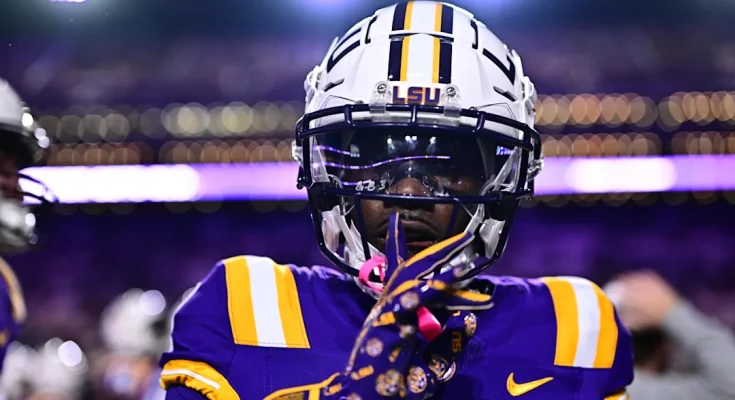The rivalry between college football powerhouses Clemson Tigers and LSU has always been intense, marked by competitive games and passionate fan bases. However, tensions recently flared off the field when LSU football head coach Brian Kelly made a provocative remark referring to Clemson’s home stadium as “Death Valley Jr.” This comment quickly stirred reactions from Clemson’s players, coaches, and supporters, who refused to let such a slight go unanswered. The resulting back-and-forth has highlighted not only the fierce pride both programs hold in their football legacies but also the enduring competitiveness that defines college football rivalries at the highest level.
Brian Kelly’s comment came during a media session ahead of LSU’s upcoming schedule. Known for his candid and sometimes blunt style, Kelly was discussing the intensity and atmosphere of college football stadiums. When referencing Clemson’s Memorial Stadium—familiarly known as Death Valley—he dismissed it as a lesser version, dubbing it “Death Valley Jr.” This remark was seen as an intentional slight against Clemson’s storied football environment and a jab at the Tigers’ home-field advantage. The comparison was particularly provocative because LSU’s Tiger Stadium is widely regarded as one of the most intimidating and electric atmospheres in college football, making the “Jr.” tag a clear attempt to diminish Clemson’s stature.
Clemson’s response was swift and unified. The program’s leadership, including head coach Dabo Swinney, expressed their displeasure with Kelly’s words, framing the comment as disrespectful and unnecessary. Swinney emphasized that Clemson’s “Death Valley” is much more than just a stadium; it is a symbol of the Tigers’ rich tradition, passionate fan base, and the relentless spirit that has powered the team through numerous successful seasons. To label it as a junior or lesser version was not only inaccurate but also an affront to the thousands of Clemson supporters who create the electric game-day atmosphere year after year.
Players also joined the chorus of rebuttal. Several Clemson athletes took to social media to defend their home stadium and their program’s proud history. They pointed out the numerous thrilling victories achieved in Death Valley, the passionate and dedicated fans who fill the stands, and the legacy of greatness established by the Tigers over decades. For many, the remark struck a nerve because it questioned the authenticity and intensity of what Clemson football represents. In response, players rallied around the idea that their home stadium is every bit as daunting and formidable as any in college football.
The debate quickly extended beyond the immediate teams and entered the broader college football community. Fans from both sides weighed in, igniting spirited discussions on forums, social media platforms, and sports talk shows. LSU supporters defended Kelly’s comments, arguing that Tiger Stadium’s capacity, noise levels, and historic moments give it a clear edge over Clemson’s venue. On the other hand, Clemson fans passionately argued that the Tigers’ tradition of excellence, the unique atmosphere of their stadium, and the loyalty of their fan base make Death Valley a true fortress that has thwarted many top-ranked teams over the years.
This exchange highlights the larger cultural and emotional significance that stadiums hold in college football. Stadiums are more than just physical locations; they are cathedrals of sport, monuments to tradition, and battlegrounds where memories are made and legends are born. The pride that programs and fans take in their home stadiums is a reflection of the deep-rooted identities that college football teams carry. For Clemson, Death Valley is synonymous with their identity as a premier football program, and any attempt to diminish it is met with fierce resistance.
The rivalry between Clemson and LSU also has added layers of complexity because of their recent encounters on the national stage. Both teams have competed at the highest levels, with national championships and playoff appearances that have elevated their programs to elite status. The competitive respect between the programs is undeniable, but as with many great rivalries, there is also an undercurrent of competitive edge that fuels such exchanges. Kelly’s remark, whether intended as lighthearted banter or a strategic psychological play, tapped into this competitive fire.
For Clemson, responding to such remarks is about more than defending a stadium; it is about protecting a legacy and affirming their status among college football’s elite. The Tigers’ success under Dabo Swinney, which includes multiple national championships and a consistent presence in the College Football Playoff, has made them a symbol of excellence. Death Valley is an integral part of that story, a place where Clemson has built a near fortress that opponents dread entering. The stadium’s reputation is tied directly to Clemson’s identity as a program that values toughness, resilience, and unwavering fan support.
The incident also brings attention to the ongoing dynamics of media and messaging in college football. Coaches and programs increasingly use media interactions as platforms to gain psychological advantages, rally their teams, or stir competitive emotions. Kelly’s “Death Valley Jr.” comment, whether intended as a casual jab or a strategic slight, demonstrates how words spoken off the field can escalate into broader conversations and rivalries. Clemson’s reaction shows the importance programs place on controlling their narrative and defending their brand in a sport where perception and pride are central to success.
Looking ahead, this exchange could add fuel to any future Clemson-LSU matchups. When teams have such spirited off-field exchanges, it often raises the stakes on the field, making the games even more intense and emotionally charged. Fans and players alike feed off the heightened energy that comes with rivalry games, and moments like these only deepen the desire to prove superiority not just in words but in results. Both programs have the talent, coaching, and history to make their encounters memorable, and now the added layer of personal and institutional pride will only make those games more compelling.
In the grand scope of college football, such exchanges are not uncommon but are always fascinating reflections of the sport’s passionate culture. Rivalries thrive on competition both on and off the field, and statements like Kelly’s serve as sparks that ignite deeper conversations about identity, legacy, and respect. Clemson’s forceful response underscores the importance of tradition and pride in college football, reminding fans and opponents alike that the Tigers will vigorously defend their honor in all aspects of the game.
Ultimately, this incident is a testament to the enduring spirit of college football rivalries. The intense emotions, the pride in home stadiums, and the desire to claim superiority are all part of what makes the sport so compelling. For Clemson, their rebuttal to Brian Kelly’s “Death Valley Jr.” remark is more than just a defense of a nickname; it is a statement of who they are as a program and what they represent in the landscape of college football. As fans eagerly await future matchups, the stakes have never felt higher, and the battle for respect, both on and off the field, continues to captivate the college football world.



